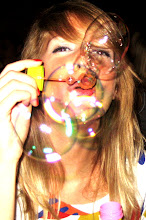 Soap Operas. Think, what is the first thing that comes to your mind? Who do you imagine watching soap operas? What is their sex, level of education, age? It's fascinating how I have a very clear image of who is watching a soap opera, in terms of all three categories, even though I have never in my life actually met a middle aged housewife who spends her days in front of the television set, mesmerized by the passionate forbidden love between a Frederico and a Maria. (In my experience, these women are usually too overwhelmed with more important things like raising their children, helping their spouses balance between work and family life or looking for a job themselves to spend their days watching TV.)
Soap Operas. Think, what is the first thing that comes to your mind? Who do you imagine watching soap operas? What is their sex, level of education, age? It's fascinating how I have a very clear image of who is watching a soap opera, in terms of all three categories, even though I have never in my life actually met a middle aged housewife who spends her days in front of the television set, mesmerized by the passionate forbidden love between a Frederico and a Maria. (In my experience, these women are usually too overwhelmed with more important things like raising their children, helping their spouses balance between work and family life or looking for a job themselves to spend their days watching TV.)And, how come they are called soap operas? I always imagined this was because all the drama, lust and passion grew exponentially, in a similar way that soap foam does when you scrub.
However, the term soap opera emerged because these shows, which came to represent the overwhelming majority of commercialized radio broadcast in the 30's, were in fact sponsored by household cleaning product brands. Opera, on the other hand referred to the portrayal of everyday life events in an opera-style, with over exaggerated drama and complex emotion.
An article about this by Robert C. Allen, intrigued me not only because the thought that soap operas could have easily been called detergent operas or disinfect operas made me giggle, but also because I have always used the term so casually, not caring enough to know its real meaning and implications.
I admit, I'm guilty. But I promise to work on it. And, let's all work on knowing what the terms we use really mean.
The soap opera always has been a "woman's" genre, and, it has frequently been assumed (mainly by those who have never watched soap operas), of interest primarily or exclusively to uncultured working-class women with simple tastes and limited capacities. Thus the soap opera has been the most easily parodied of all broadcasting genres, and its presumed audience most easily stereotyped as the working-class "housewife" who allows the dishes to pile up and the children to run amuck because of her "addiction" to soap operas [...] Despite the fact that its appeals for half a century have cut across social and demographic categories, the term continues to carry this sexist and classist baggage.This made me think... As women did not have much of a chance to work in the years when soap operas were emerging, it should not be surprising that they were the primary audience of anything that would broadcast during the day. Moreover, passing a sexist or classist judgment is fallacious as it must have been mainly the powerful prosperous men who designed the form of these shows, as a way to satisfy advertisers while meeting what they themselves decided would be the interest of the consumers. Mocking women or the uneducated as the mindless followers of soap operas is blaming them for something that others created.
I admit, I'm guilty. But I promise to work on it. And, let's all work on knowing what the terms we use really mean.

No comments:
Post a Comment